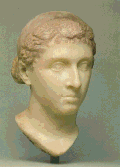


|
Cleopatra: From I to |
|
Fall 2001

|
|
| |||
|
|
Fall 2001 |
| ||
|
|
| |||
|
Instructor: Robert W. Cape, Jr., Associate Professor of Classics |
| |||
|
Office: AD 310 |
Office Hours: MWF 1:30-2:30 p.m. and by appt. or just dropping by |
| ||
|
Phone: (903) 813-2241 |
Fax: (903) 813-2011 |
Mail: #61653 |
Email: rcape@austincollege.edu |
|
|
C/I Leaders for this course: |
#61180 |
#60815 |
#60800 |
#60638 |
|
|
|
|
|
|
---- Communication/Inquiry is Austin College's "Freshman Seminar," the initial course in the undergraduate core curriculum. Our course will focus on the historical character and representations of Cleopatra VII, but we will also devote considerable time to developing your skills in writing, oral communication, critical thinking, computer technology, library usage, and test preparation. The disciplinary skills emphasized are historical research and literature and film interpretation.
---- The focus of the course is Cleopatra VII, Ptolemaic ruler and Pharaoh of Egypt, mistress of Julius Caesar, wife of Mark Antony. In the West, Cleopatra has become an important cultural icon representing different things to different groups of people: an intellectual and influential woman, a powerful yet benevolent ruler, a seductive woman from the East, a historical figure from the foggy past, an influential historical woman of color. We will examine the historical evidence for her life and the relationship between Egypt and Rome in the first century B.C., analyze representations of her from ancient times to the present, compare her images in traditional arts and contemporary pop culture, and endeavor to represent her to others in group presentations for area schools. We will work with a wide variety of primary and secondary materials, including recent archaeological finds, historical texts, scholarly essays, poetry, drama, film, television, and internet sources of popular culture. By the end of the course, students will not only know more about this intriguing and complex woman from our past, but also understand how historical figures appeal to people differently at different times and how we choose to emphasize certain aspects of history to suit our own purposes and needs.
TEXTS
---- The following texts are required for the course and should be purchased or borrowed for the semester (however you do it). The books should be brought to class when they are assigned as part of the day's reading. Copies will be available, where possible, for short-term (2hr) consultation at reserve desk in Abell Library.
STRUCTURE OF COURSE
---- The regular daily activities of the course include reading the assigned texts, writing summaries of the texts or contributing to a web-based discussion, listening to a report by a fellow student, and listening to a lecture or participating in an in-class discussion. Most class sessions will be devoted to discussion of the readings or films, but there will be several lectures, especially at the beginning of the semester. Cell phones and pagers must be turned off during class. Monday evenings are reserved for films related to the course and all students need to attend these showings. One Wednesday evening session is also required, on October 24. Since notice is given at the beginning of the semester, it is expected that there will be no conflicts with this date. There will be several announced quizzes, two (2) midterms, three small group reports, an educational project presenting to students at one of the local schools, and a final research paper. In addition, students are asked to become involved in community activities in Sherman, and participation in five (5) community events is built into the course as an introduction to the area.
---- Writing, especially editing and re-writing, is a major emphasis of this course and you will be asked to do some writing for almost every meeting. Most of the assignments are small, usually in the form of one or more note cards, and should contribute to the larger project of writing and re-writing the research paper (10 pages). Practice with writing and the critical analysis of texts are the most important contributions C/I can make to your college career.
---- The C/I Leaders ("CLs") will help lead discussions in class and on-line, and will help with all writing assignments. Our CLs are excellent students themselves and are eager to assist you in your adjustment to college life. They will establish office hours after the semester begins. Please note that CLs are not responsible for your grades in the class.
GRADES
--=- Grades on assignments and activities contribute to your final grade as follows:
|
Attendance and Participation |
10% |
|
Précis and web discussion board work |
15% |
|
Midterms (2@10% ea.) |
20% |
|
Quizzes |
10% |
|
Reports (one individual, one small group) |
5% |
|
Pop culture project |
5% |
|
Education project |
10% |
|
Community events |
5% |
|
Research paper & final essay |
20% |
ACADEMIC INTEGRITY (from The Environment, 2001-02, pp. 20-22)
---- "Trust is an essential assumption of our learning encironment. The faculty and officers of the College assume that entering students, in admission to AC, are aware that they are committing themselves to high standards of academic integrity, and to the norms and procedures by which the College observes and enforces these standards." An excerpt from Austin College's Academic Integrity Policy:
|
Cheating and plagiarism are primary violations of academic integrity. Actions which create an unfair advantage by impeding the access of other course members to important information or sharing improperly received information also violate academic integrity. In recognition that such violations can be differently defined, the college leaves to instructors the authority to determine what is expected in a particular course of a particular assignment. Instructors will normally provide written instructions to cover any unusual circumstances. The settings in which this behavior is most common include but are not limited to classrooms, libraries, studios, and laboratories. Learning is a social process in which all are responsible for helping to assure the quality and integrity of the experience. Certain behavior which interferes with the academic work of others may be considered a non-academic behavior violation, rather than a matter of academic integrity. Examples of such behavior involving academic activities include violating copyright laws (software and print materials), interfering with study environments in residence halls, destruction of library materials not involved with a course assignment (e.g. cutting out a journal article), unwillful failure to return a reserve book, and disrupting a graded performance. Evidence of malicious charges of such behavior will be directed to the appropriate bodies (Student Conduct Council or Faculty Grievance Committee). If there is a question about whether student behavior classifies as academic or non-academic, the questioner should consult with the vice president for academic affairs who will confer with appropriate college staff. |
General Guidelines for Student Work Unless otherwise informed in writing by the faculty member, students should assume that the following parameters are in effect for course work. Closed-book tests -- The student is expected to do work which is exclusively his or her own without the use of notes or other materials prepared before the test. A test is assumed to be "closed-book" unless designated otherwise. Papers -- When the paper includes direct quotes or when an idea comes directly from a source then that source must be acknowledged. Accepted form of the acknowledgement is left to the instructor. When the student makes clear the dependence on sources in proper fashion, the expectations of integrity are met. Collection of information -- The student is expected to collect information in a research exercise and not to fabricate or falsify the results. Exercises -- The student is expected to do assignments without collaboration on work submitted for a grade unless expressly instructed otherwise. Other assignments -- It is expected that when a student receives significant help on an assignment, then that help (peers, faculty, references, publications, other) will be acknowledged. Since "significant" cannot be defined for every situation, any question should be directed to the instructor. |
It is expected that all students have read and agreed to abide by the Academic Integrity Policy.
SYLLABUS
---- The following is an outline of our readings and assignments for the semester. Some readings and/or assignments may change, with at least one week advance notice. Note that all readings are to be done before class, reports will be given in class on the day indicated, and writings are due at the beginning of class. Some materials will be found in our couse at http://www.courses.prometheus.com.
|
1 |
Monday, 9/3: Registration | ||
|
Wednesday, 9/5: Introduction to the Course: Cleopatra From I to 2525
| |||
|
Friday, 9/7: Cleopatra's Background and Early
Years
|
|
2 |
Monday, 9/10: Alexandria
***Tuesday, 9/11: Last day to add a course | |||
|
Wednesday, 9/12: Study skills for history, literature,
art history
| ||||
|
Friday, 9/14: Library orientation
| ||||
|
3 |
Monday, 9/17: Cleopatra and Caesar I
***Tuesday, 9/18: Last day to change a grading system | |||
|
Wednesday, 9/19: Cleopatra and Caesar II
| ||||
|
Friday, 9/21: Cleopatra and Antony I
|
|
4 |
Monday, 9/24: Cleopatra and Antony II
***Tue-Thur 9/15-28: Off-campus January term registration | |||
|
Wednesday, 9/26: Cleopatra and Antony III
| ||||
|
Friday, 9/28: Cleopatra and Antony IV ... and
Octavian
|
|
5 |
Monday, 10/1: Primary Sources I (Texts)
***Tuesday, 10/2: Last day to drop a course without a grade | |||
|
Wednesday, 10/3: Primary Sources II (Archaeology)
| ||||
|
Friday, 10/5: Midterm I |
|
6 |
Monday, 10/8: Introduction to Shakespeare's Antony
and Cleopatra
| |||
|
Wednesday, 10/10: Antony and Cleopatra, Act
I
| ||||
|
Friday, 10/12: Fall Break (no class) |
|
7 |
Monday, 10/15: Antony and Cleopatra, Acts
II-III
***Tuesday, 10/16: On-campus January term registration | |||
|
Wednesday, 10/17: Antony and Cleopatra, Acts
IV-V
| ||||
|
Friday, 10/19: Bernard Shaw's Caesar and
Cleopatra
|
|
8 |
Monday, 10/22: Bernard Shaw's Caesar and
Cleopatra
| |||
|
Wednesday, 10/24: Discussion of Cleopatra
| ||||
|
Friday, 10/26: Discussion of 1963 film
|
|
9 |
Monday, 10/29: Scholarship on Cleopatra in film
***Tuesday, 10/30: Last day to drop a course with a WP, WF, or WU | |||
|
Wednesday, 10/31 : Discussion of 1999 film
| ||||
|
Friday, 11/2: Career Services Presentation
| ||||
|
10 |
Monday, 11/5: Was Cleopatra Black?
| |||
|
Wednesday, 11/7: Further Scholarship on Cleopatra
| ||||
|
Friday, 11/9: Further Scholarship on Cleopatra
|
|
11 |
Monday, 11/12: Midterm II | ||
|
Wednesday, 11/14: Cleopatra in Contemporary/Pop
Culture
| |||
|
Friday, 11/16: Cleopatra in Contemporary/Pop
Culture
|
|
12 |
Monday, 11/19: Cleopatra in Contemporary/Pop
Culture | ||
|
Wednesday, 11/21: Cleopatra in Contemporary/Pop
Culture
| |||
|
Friday, 11/23
|
|
13 |
Monday, 11/26: Introduction to education project
| |||
|
Wednesday, 11/28: Small group work on education
project | ||||
|
Friday, 11/30: Small group and whole class discussion
of education project
|
|
14 |
Monday, 12/3: Small group work on education
project | ||
|
Wednesday, 12/5: Small group work on education
project | |||
|
Friday, 12/7
|
|
15 |
Monday, 12/10: Reading day & review for
final | ||
|
Tuesday, 12/11: Final Exam (3:00-5:00 p.m.)
| |||
|
Friday, 12/13: Last day of exams |
Robert W. Cape, Jr., Associate Professor of Classics Classical & Modern Languages 900 N. Grand Avenue, Suite 61653 Sherman, TX 75090-4440 phone: (903) 813-2241 fax: (903) 813-2011 |